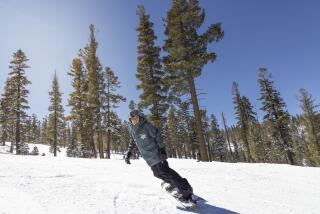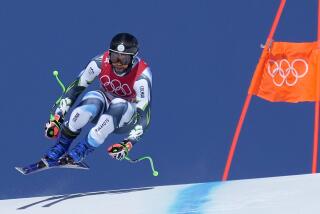Ride of His Life
- Share via
Dave Cullinan could become the Lance Armstrong of downhill mountain bike racing. The parallels are there. He and Armstrong are both former world champions who have recovered from life-threatening medical problems.
Armstrong, of course, put an exclamation point on his comeback from testicular cancer by winning the 1999 Tour de France.
Even if Cullinan never reaches the same heights, his recovery from an aortic aneurysm and three heart surgeries is no less remarkable.
Cullinan won’t settle for being just another TV news magazine survivor story. A crew from “Dateline NBC” followed him for a couple days last year, but he doesn’t know whether the feature has aired. “I have no idea,” he said.
It’s not fame he craves, he said; he just wants to ride--and win.
“I haven’t given up,” said Cullinan, who lives in Mission Viejo, “because I know that I haven’t got a fair shake of the stick yet.”
There was nothing fair about the way Cullinan dominated his downhill competition during the early 1990s. Part of a wave of Southern California BMX riders who made the switch to mountain bikes, Cullinan won eight of nine races in 1992, including the world title race.
“Even today Dave is probably one of the best bike handlers in the world,” said Leigh Donovan, a longtime friend, the fourth-ranked female downhiller in the world and a teammate on the Schwinn-Toyota Rav4 team. “Back then I think he was a step ahead of everyone. He rode with great confidence in himself and that’s what made him such a great champion.”
Cullinan was well-rewarded for his success, making more than $100,000 annually in prize money and sponsorships. He was in his early 20s, owned a house in Durango, Colo., and was paid to ride his bike all over the world. Life couldn’t be much sweeter.
The good times ended suddenly. In March of 1994, Cullinan was rushed to a Scottsdale, Ariz., hospital with severe chest pains.
Cullinan was in Arizona with his mountain bike team preparing for a preseason event. He was talking on the phone in the house they had rented when he first felt discomfort that soon intensified.
“It felt like I got stabbed in the heart and I collapsed on the ground screaming and yelling,” he said. “Then it hurt so bad that I couldn’t even yell anymore.”
The emergency-room doctor told Cullinan he had a heart murmur, gave him some aspirin and sent him back to the house. The pain persisted, so Cullinan went back to the hospital the next morning. Doctors then discovered a tear in his aorta, the main artery leaving the heart.
“They saw,” Cullinan said, “that I was a half hour away from dying.”
While he was going into surgery, the aorta burst and his heart stopped. Surgeons revived him and repaired the aorta with a titanium heart valve.
Days later, doctors told him that he had a heart disease that required him to take blood-thinning medication. A hard crash, a common occurrence for pro mountain bikers, could be fatal, so he would have to quit racing. They might as well have told him to stop breathing.
“They told me to forget about being an athlete,” Cullinan said. “I’ve been racing since I was 13 and I’ve been riding motorcycles since I was 2 1/2. “
Such was the beginning of Black ‘94, as Cullinan now calls the year. During the next several months, he sunk into deep depression. He and his wife divorced, his father died, he was forced to sell his house and give up his car lease.
He moved back to Southern California to live with his mother and stayed in bed for days at time.
“I basically was just so depressed that I didn’t know what to do to get myself out of it,” Cullinan said. “The whole thought of how can I end my life was my biggest question.”
Eventually he pulled himself out of the funk and visited a psychiatrist. It wasn’t long before he was back racing again. He even did some color commentary on ESPN telecasts. “He was so awesome,” Donovan said. “ ‘Oh, my God,’ we thought, ‘This is his calling; he’s the best we’ve ever had.’ ”
But Cullinan didn’t want to talk, he wanted to ride and in his spare moments he researched his heart problem. He discovered another mountain biker had a similar operation in which his aorta was repaired with a transplanted human valve instead of a titanium one.
He looked up the doctor who had performed that surgery, Donald Doty of Salt Lake City, and in December 1994 was having his second open-heart surgery.
Three months later, he was taking his first tentative steps back to racing. He had previously discovered his heart problem was caused by an injury, not a disease. Four months before the scary night in Scottsdale, he had crashed during practice at the 1993 world championships. A mechanic hadn’t properly tightened his bike’s rear wheel and it fell off as Cullinan approached a jump, sending him flying over the handlebars.
His chest crashed into the jump, knocking the wind out of him and, it turned out, damaging his heart.
It was a slow process to regain his strength, but soon he was gaining momentum. He barely slowed down long enough for more heart surgery in January, 1996, to repair scar tissue.
In 1998, he climbed back onto the winner’s podium, finishing first in the dual slalom in three World Cup events and two events in the NORBA Championship Series.
Last year, Cullinan started strong, winning the first NORBA race, beating his friend and fellow Orange County-resident Brian Lopes in the final at Big Bear. Then he went to Europe and finished second in the dual slalom in a race in Italy. But back in the United States, he crashed in downhill practice during a race in Pennsylvania, dislocating his shoulder and the upper end of the humerus bone in his arm.
The injury essentially ended his season. He started two events later in the year to try to gain points, but had to withdraw from each.
Now Cullinan, 30, is preparing for 2000.
Cullinan is confident this will be his year and he will be able to start proving it May 20 at Snow Summit in Big Bear. He plans to keep pushing himself until he is no longer competitive.
“If I have a good race and come across the finish line and look up and it says 18th,” Cullinan said, “it’s time to start filling out job applications.”
More to Read
Go beyond the scoreboard
Get the latest on L.A.'s teams in the daily Sports Report newsletter.
You may occasionally receive promotional content from the Los Angeles Times.









